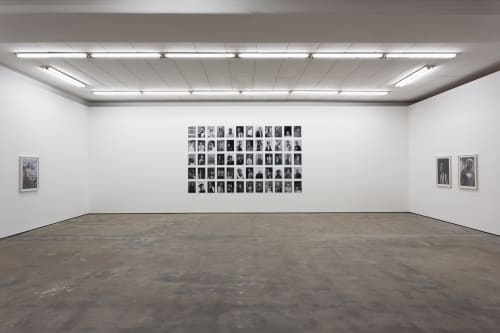“We live in fear,” Muholi said. “And what are we doing about it? You have to document. You are forced to document.”
Art as a means to effect political and social change constantly raises the question as to what role the artist can play. Zanele Muholi is a South African photographer who sees herself as a “visual activist” and, since her participation in documenta 13, she has also been known as an advocate for the LGBTI (lesbian, gay, bisexual, transgender, intersex) communities. A show of her works opens January 18th, 2014, at Wentrup. Muholi’s solo exhibition in Berlin features selections from three groups of works: black-and-white portraits from her ongoing project Faces and Phases, a sequence of color photographs from the Beulah series, and a documentary video work.
A core motivation for Muholi’s works is to make visible and document the lives of black homosexual women in South Africa. In a society that spawns so-called “curative rapes” – planned rapes of homosexual women by heterosexual men, it is a highly explosive endeavor to be engaged on behalf of this community. Muholi is actively involved, especially through Inkanyiso, the collective she founded in 2006. She generates attention, but it does not come without a backlash: her apartment was broken into while she participated in documenta; a hard disk with images was stolen. This direct attack on Muholi’s Faces and Phases project aimed to thwart her attempt to continue to expand an archive that already includes more than 60 portraits.
The women portrayed in Faces and Phases, typically in torso or half-length portraits, look directly and self-confidently into the camera. The title Phases relates to a personal, liminal, transitional stage of life. But we can also comprehend Phases in terms of society – since it is particularly the transition and emergence phases of the South African Rainbow Nation (a term coined by Archbishop Desmond Tutu) that have been shaping the coexistence of the different social groups. The groupings have to do not only with skin color, but also with gender. And so Muholi’s photographs function as referential pieces of evidence, because Faces and Phases proclaims, empowers and witnesses: “we are here”. A selection of these important pictures, which were awarded the Prince Claus Prize for Photography in 2013, can be seen on the gallery’s central wall.
The second group of works, Beulahs is comprised of color photographs whose objectives are more than documentary. Building on the basis of Muholi’s engagement as a “visual activist”, these staged photographs show her to be a versatile artist as well, one who skillfully juggles visual narratives and iconographies of clothing. Young men stand in front of rough concrete walls and look shyly, smilingly,
but also mistrustfully at the camera. One kneels on the grayish-black ground of ash and charcoal. Colorful clothing and jewelry accessories gleam in contrast to the earthier hues in the foreground and background. At second glance, the subjects appear perhaps too naïve for the scorched ground on which they stand. The South African art historian Tamar Garb describes this series as an intentional cross-fade, visually superimposing the bodies of young men with eroticizing accessories derived from pop culture, beaded skirts and colorful plastic combs in their hair. Last but not least, the Beulahs series is also a clever new take on colonial portraiture – Muholi employs photography’s well-known strategies of draping, staging and sexualizing bodies. While the individuals portrayed in Faces and Phases look at us in order to affirm their existence, the Beulahs respond to being looked at in portraiture by – so it seems – hurling that gaze back at us.
Zanele Muholi contributes to social change as a “visual activist” and is equally versatile as an artist in the medium of photography. The conjunction creates an extremely exciting nexus of staged portraits and portrait-like settings, as the Wentrup exhibition demonstrates.

